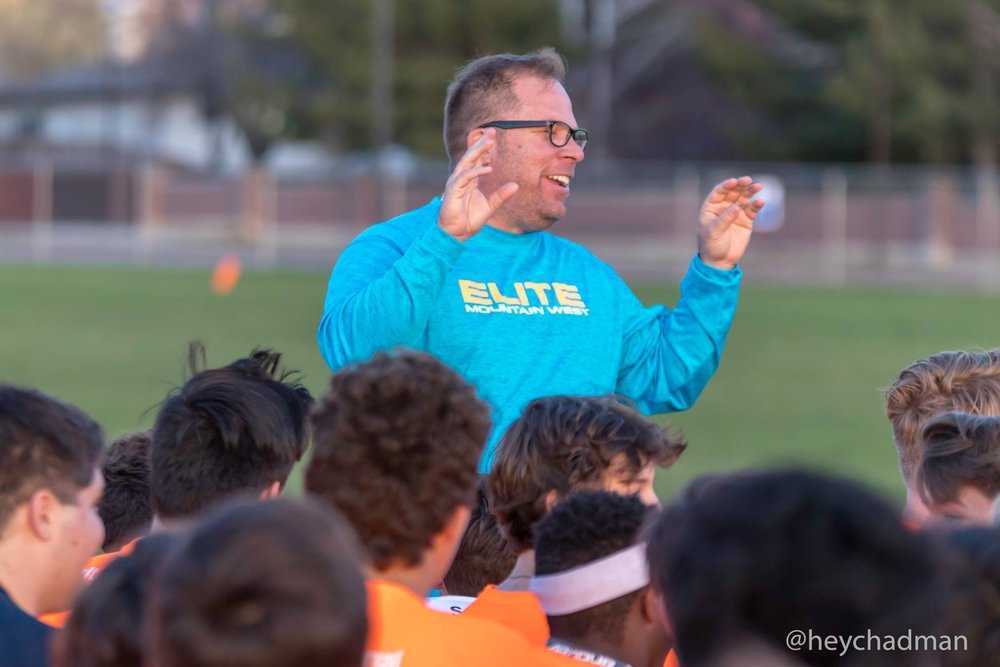Riley Jensen supports athletes’ mental health
Mental health performance coach Riley Jensen has always had a passion for sports. He was a quarterback for Snow College in the 1996 season where the team went 8-2 and played in the Real Dairy Bowl. Jensen eventually transferred to Utah State University where his promising football career ended abruptly after a concussion.
“After that moment, the program changed,” Jensen said. “My coach started playing the second-string quarterback in an attempt to rebuild.”
Jensen then became an offensive coordinator for Snow College for a short time. Afterward, he transitioned into a sales job with Stryker, a Fortune 500 company that sells medical equipment. Jensen said he was content with the job as it provided enough money for him and his young family.
Jensen’s wife, Georgann, saw more. He said she told him he was not living a fulfilling life as a salesman and challenged him about it.
“She said, ‘I don’t want to see you come through that door one more time doing a job that you hate,’” Jensen said. “‘You don’t want to do sales forever.’”
Jensen took the challenge seriously and re-evaluated. At age 39, he applied to the University of Utah and went on to earn his bachelor’s degree in sports psychology. Jensen believes the change gave him a new life.
“I haven’t worked or studied a day in my life since going back,” Jensen said.
Since graduating, Jensen worked as a performance coach for many programs including Weber State University. But after about five years, Jensen took an opportunity that brought him back to Utah State.
Right now, Jensen is providing weekly support methods for the Utah State women’s tennis team.
Jensen’s support program is built on six pillars of support which he describes as “preventative medicine rather than reactive medicine.” Those pillars are focus and concentration, managing sports anxiety, mindfulness, self-talk, constructing routines and emotional management.
At the start of the season, he began with structured methods that addressed each pillar individually. He wanted to be sure everyone on the team understood how to interact with him. But as time went on, it became more focused and individualized for the players.
“He looks at how we feel in the moment,” said junior tennis player Indya Nespor. “Now if we need to focus on one thing specifically, we can talk to him.”
Nespor said an important pillar for her has been developing good routines.
“Everyone has an emotional state when they play,” Nespor said. “For me, it’s about staying calm. So I have a routine playlist that I listen to that helps me get locked in.”
Nespor said Afrobeats and exciting country are what help her out the most. Her current jam is “Love on Me” by Jtbazz.
“When I listen, I find it easier to concentrate on the game ahead,” Nespor said.
Because Jensen’s program is as-needed and individualized, the tennis players find success comes more naturally because they can focus on what is affecting them rather than focus on something that may already be under control.
“Mental health and strength really matter in tennis and as a student,” said fifth-year Zeynep Naz Ozturk. “I can be so hard on myself after losses.”
For this, Jensen has Ozturk focus on the managing stress pillar.
“What that means is focusing on controlling the things that I can control,” Ozturk said.
These methods have helped Ozturk achieve an overall good record for her individual matches.
“It’s important to remember that focus keeps us going,” Jensen said. “It’s easy to lose focus when things are going well for us. So, having a goal that keeps your focus on success is important.”
“It’s helped me stay focused,” said tennis player Laura Fernanda Eugenio De Hilario. “The double-breath breathing technique keeps me in my routine.”
De Hilario had a difficult season last year. She finished 2-10 as the fourth player in rotation. During her time with Jensen, De Hilario has worked on improving her focus. Jensen gave her a double-breath breathing technique she uses, and a journal routine. This is intended to keep her focused on the goals she has for tennis and academics.
This season, she has moved up to third player and has started out strong, going a perfect 4-0 in her rotation.
“Tennis is a lot of ups and downs,” De Hilario said. “Being aware of that, and giving it 100% is the goal. But also, being aware that we aren’t perfect and can make mistakes.”
One thing the players expressed appreciation for is Jensen’s extensive knowledge of tennis.
“My dad was a tennis coach here at USU when I was young,” Jensen said.
Having exposure when he was young and consistently playing tennis with his father and against the wall gave him a strong respect for the sport.
Jensen takes pride in his job. He said he is always striving to do his best each day — just like the athletes he works with.
“When I look into the eyes of the athletes, I remember my time,” Jensen said. “I get just as much of a thrill when they are successful as they are. I know how much work goes into it, and what it means to them.”

